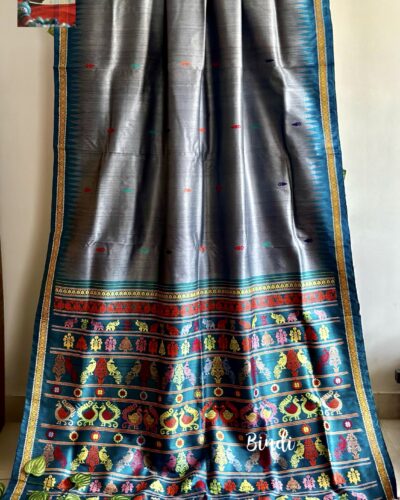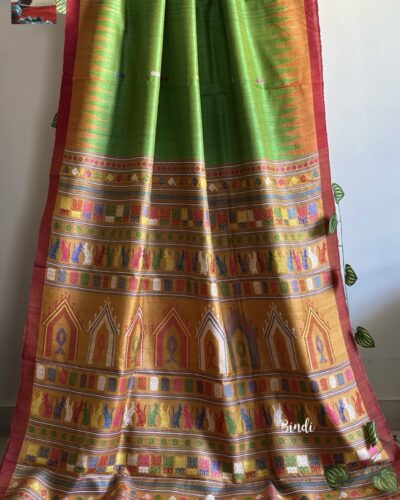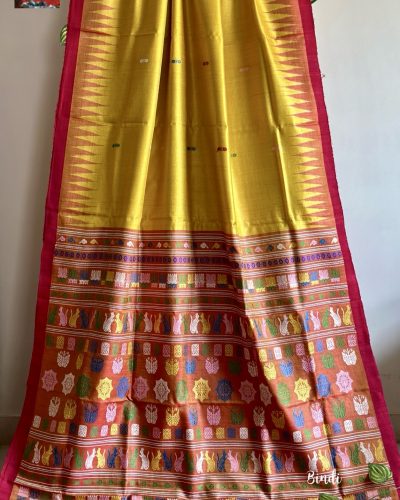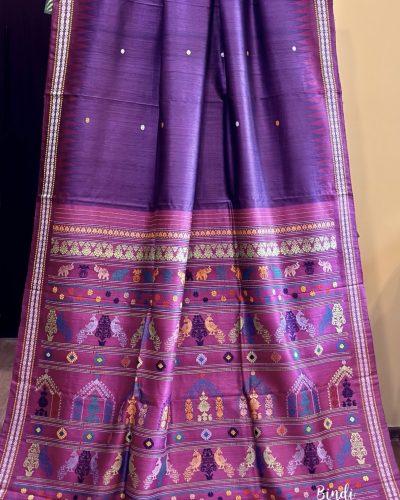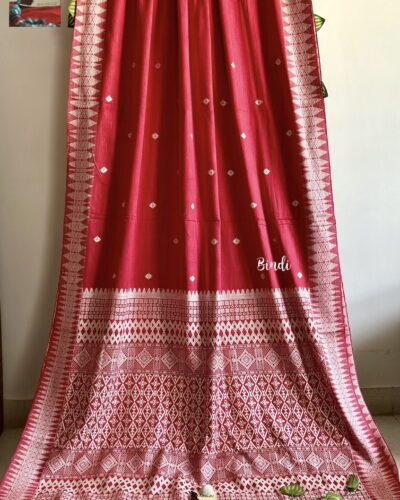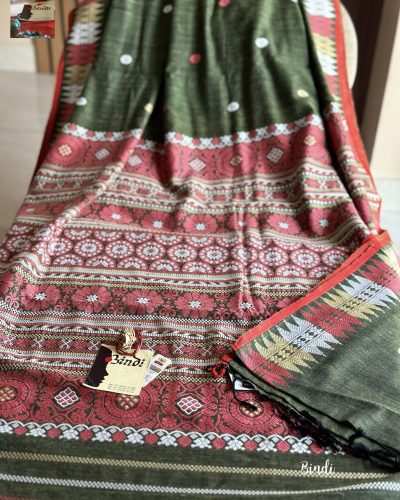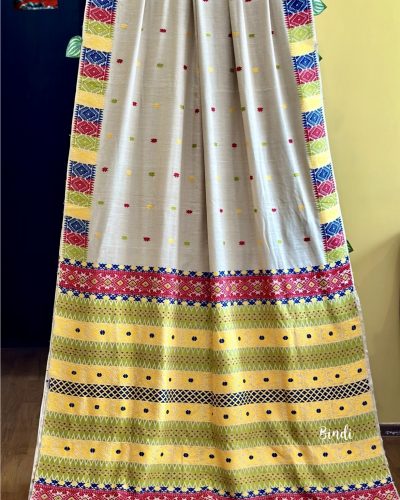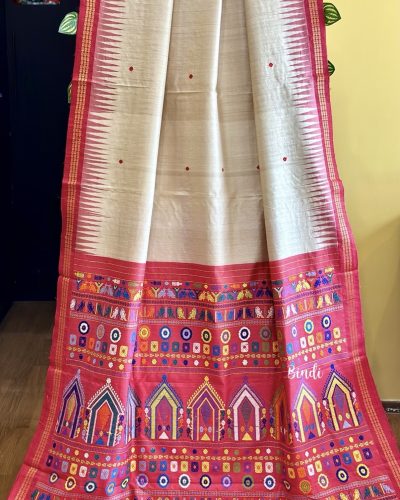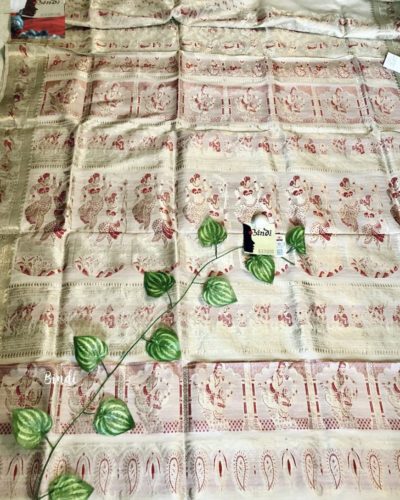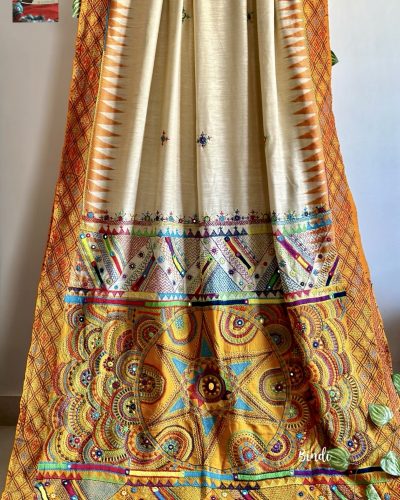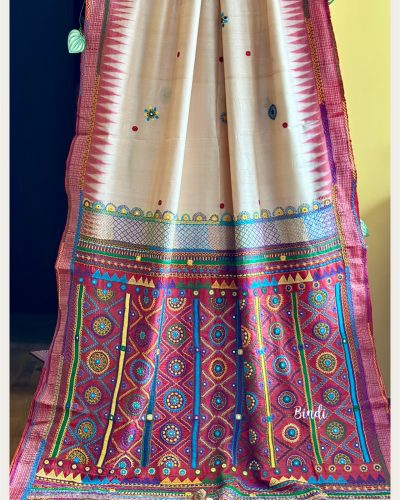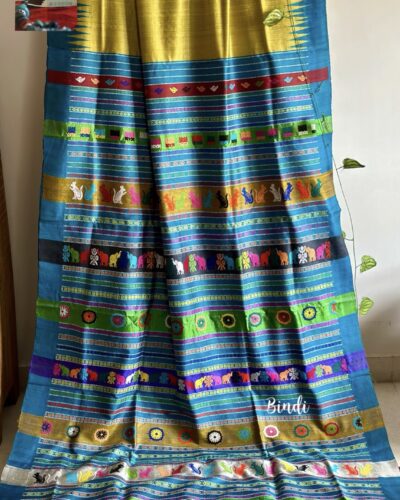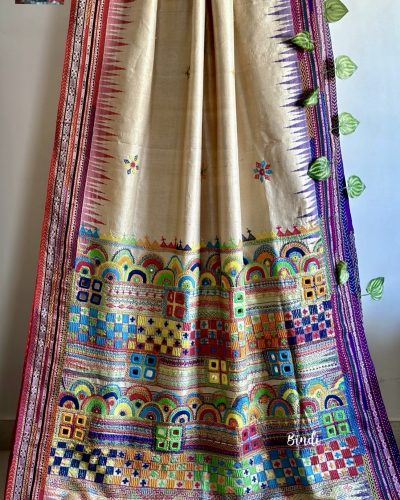-
Sold out!
Kirit – Handwoven Handspun Gopalpur tussar Jala Palla Saree
Handwoven Handspun fine tussar with extra weft from Gopalpur, Orissa
This saree is famously known as the “Jala Saree” because of the grand Jala work that has been done on the pallu.
Saree length 6.5 mts including blouse piece
Gopalpur Tussar from Gopalpur weaving village of Odisha is a most unique Geographical Indication (GI). Tussar Silk grows in plenty in the wild in Odisha’s Keonjhar, Mayurbhanj and other districts. This Handspun fine jala tusdsr silk is woven to create magical sarees.
₹24,000.00 -
RAMCHANDRAPEDI (Black) – DOUBLE PALLA HANDWOVEN HANDSPUN GOPALPUR TUSSAR
Ramchandra pedi
Handwoven Handspun double anchal fine Gopalpur tussar with jaala palla.
This saree has intricately weaved motifs of shankh, chakra, Padma , elephant, squirrel woven on the palla. This is known as Ramchandra pedi because saree entwines the auspicious symbols of Lord Ramchandra. It is believed that the fine stripes on the squirrel’s body was formed when Ramchandra gently stroked his fingers on their head.Saree length 6.5 mts including blouse piece
₹24,950.00 -
UTKAL KONYA V ~ HANDWOVEN HANDSPUN PURE DOLABEDI GOPALPUR TUSSAR SILK
In ancient time,in Odisha,Dola Utsav was celebrated on a pavilion situated in Agni kona ( South East corner ) Of Jagananth Temple. The pavilion is called Dola Mandap and the street is called Dolamandap Sahi. Once in a celebration, Shribhuja ( hand ) of Lord Jagannath had broken due to accidental broken of swing. After that incident, representative deity ( Chalanti Pratima – Bije Pratima) of Lord Jagannath joined the function (Dola Utsav) always. Several years passed the pavilion ruined, Shri Bira Keshari Deba constructed one new Mandap outside from Meghanad Wall, Mandap is generally known as Dola Bedi. At the present time Dola Purnima is celebrated at Dola Bedi.
This beautiful handwoven handspun fine Gopalpur tussar #dolabedi saree motifs are a portrayal of “Dola” (canopy), and “Bedi” (ground)blended with other flora and fauna.
Saree length 6.4 mts including blouse piece₹25,000.00 -
Sold out!
Ramchandrapedi (Yellow) – Handwoven handspun Fine Gopalpur Tussar Saree
Ramchandra pedi
Handwoven Handspun fine Gopalpur tussar with jaala palla.
This saree has intricately weaved motifs of shankh, chakra, Padma , elephant, squirrel woven on the palla. This is known as Ramchandra pedi because saree entwines the auspicious symbols of Lord Ramchandra. It is believed that the fine stripes on the squirrel’s body was formed when Ramchandra gently stroked his fingers on their head.Saree length 6.5 mts including blouse piece
₹25,000.00 -
UTKAL KONYA VI ~ DOLABEDI GOPALPUR HANDSPUN FINE TUSSAR
Dolabedi : In ancient time,in Odisha,Dola Utsav was celebrated on a pavilion situated in Agni kona ( South East corner ) Of Jagananth Temple. The pavilion is called Dola Mandap and the street is called Dolamandap Sahi. Once in a celebration, Shribhuja ( hand ) of Lord Jagannath had broken due to accidental broken of swing. After that incident, representative deity ( Chalanti Pratima – Bije Pratima) of Lord Jagannath joined the function (Dola Utsav) always. Several years passed the pavilion ruined, Shri Bira Keshari Deba constructed one new Mandap outside from Meghanad Wall, Mandap is generally known as Dola Bedi. At the present time Dola Purnima is celebrated at Dola Bedi.
This beautiful handwoven handspun fine Gopalpur tussar Dolabedi saree motifs are a portrayal of “Dola” (canopy), and “Bedi” (ground)blended with other flora and fauna.
Saree length 6.4 mts including blouse piece₹25,450.00 -
Lal Ishq ~ Handwoven Pure Eri by Eri Silk Saree
The Silk Village of Assam
Just a handful of us may have heard of Sualkuchi, a quaint village not very far from Guwahati, the largest city of Assam. This picturesque village, however, is heaven for silk fabrics, and is known as the ‘Manchester of East’ as well as the ‘Weaving Mecca of Assam’.
Sualkuchi silk earns GI tag. Sualkuchi offers various silk fabrics to the world, including the golden Muga, ivory white pat, and light beige eri or endi silks.Saree Description:
Eri silk x Eri Silk Saree.Eri Silk is used in design Motifs.
Saree length 6.4 mts including blouse piece#
₹25,850.00 -
Kavya – HANDWOVEN PURE ERI SILK SAREE From Assam
The Silk Village of Assam
Just a handful of us may have heard of Sualkuchi, a quaint village not very far from Guwahati, the largest city of Assam. This picturesque village, however, is heaven for silk fabrics, and is known as the ‘Manchester of East’ as well as the ‘Weaving Mecca of Assam’.
Sualkuchi silk earns GI tag. Sualkuchi offers various silk fabrics to the world, including the golden Muga, ivory white pat, and light beige eri or endi silks.Saree Description:
Eri silk x Eri Silk Saree.Eri Silk is used in design Motifs.
Saree length 6.4 mts including blouse piece₹25,850.00 -
KAVYA I – HANDWOVEN PURE ERI SILK SAREE FROM ASSAM
The Silk Village of Assam
Sualkuchi, a quaint village not very far from Guwahati, the largest city of Assam. This picturesque village, however, is heaven for silk fabrics, and is known as the ‘Manchester of East’ as well as the ‘Weaving Mecca of Assam’.
Sualkuchi silk earns GI tag. Sualkuchi offers various silk fabrics to the world, including the golden Muga, ivory white pat, and light beige eri or endi silks.Saree Description:
Red Eri silkx Eri Silk Saree.Eri Silk is used in design Motifs.
Red eri is a type of silk that comes from the cocoons of red-gold Philosamia ricini silkworms. The silkworms feed on particular species of ficus leaves, and the color of the cocoons can range from white to gold to red. The red color of eri silk is natural.Saree length 6.4 mts including blouse piece
₹25,850.00 -
Utkal Konya II ~ Handwoven Handspun Pure Dolabedi Gopalpur Tussar Silk
Dolabedi : In ancient time,in Odisha,Dola Utsav was celebrated on a pavilion situated in Agni kona ( South East corner ) Of Jagananth Temple. The pavilion is called Dola Mandap and the street is called Dolamandap Sahi. Once in a celebration, Shribhuja ( hand ) of Lord Jagannath had broken due to accidental broken of swing. After that incident, representative deity ( Chalanti Pratima – Bije Pratima) of Lord Jagannath joined the function (Dola Utsav) always. Several years passed the pavilion ruined, Shri Bira Keshari Deba constructed one new Mandap outside from Meghanad Wall, Mandap is generally known as Dola Bedi. At the present time Dola Purnima is celebrated at Dola Bedi.
This beautiful handwoven handspun fine Gopalpur tussar #dolabedi saree motifs are a portrayal of “Dola” (canopy), and “Bedi” (ground)blended with other flora and fauna.
Saree length 6.4 mts including blouse piece₹25,950.00 -
Sold out!
UTKAL KONYA III ~ HANDWOVEN HANDSPUN PURE DOLABEDI GOPALPUR TUSSAR SILK
Dolabedi : In ancient time,in Odisha,Dola Utsav was celebrated on a pavilion situated in Agni kona ( South East corner ) Of Jagananth Temple. The pavilion is called Dola Mandap and the street is called Dolamandap Sahi. Once in a celebration, Shribhuja ( hand ) of Lord Jagannath had broken due to accidental broken of swing. After that incident, representative deity ( Chalanti Pratima – Bije Pratima) of Lord Jagannath joined the function (Dola Utsav) always. Several years passed the pavilion ruined, Shri Bira Keshari Deba constructed one new Mandap outside from Meghanad Wall, Mandap is generally known as Dola Bedi. At the present time Dola Purnima is celebrated at Dola Bedi.
This beautiful handwoven handspun fine Gopalpur tussar #dolabedi saree motifs are a portrayal of “Dola” (canopy), and “Bedi” (ground)blended with other flora and fauna.
Saree length 6.4 mts including blouse piece₹25,950.00 -
Swarna Mrigaya – Handwoven Pure Gachi tussar Swarnachari Saree
Handwoven Pure Gachi tussar Swarnachari saree. Saree length 6.4 mts including blouse piece
The Baluchari and Swanrachari sarees are originated 500 Years ago in West Bengal. The name came into existence because the weaving of these sarees started in a small village called Baluchar in the Murshidabad district of West Bengal. The sarees are known for their intricate patterns and handwork on them. It can easily be identified from the construction of long pallu/anchal and placement of its design motifs in perfect rectangular closed corners that maintain continuity of the designs without break.
₹25,995.00 -
Sold out!
The Golden Sunshine – Lambani Hand Embroidery on Gopalpur tussar
Lambadi, Labanki or Gor-boli, also called Banjari, is a language spoken by the once nomadic Banjara people across India and it belongs to Indo-Aryan group of languages. They moved to South India from Rajasthan along with the Mughal army in the 16th century and settled in Bijapur district of Karnataka.
Lambani women traditionally make embroidered handicrafts from scrap by pulling out thread from old saris and sewing together patches of cloth, which was then embellished with embroidery, mirror work, cowrie shells, beads and coins.
Today, Lambani women have put their traditional embroidery craft on the international map by adapting to the changing demands of international fashion.
Lambani embroidery done on handwoven Eri tussar with temple border from Gopalpur, Orissa – a classic combination!
₹26,000.00 -
Yara Sili Sili – Lambani Hand Embroidery on Gopalpur Tussar
Lambadi, Labanki or Gor-boli, also called Banjari, is a language spoken by the once nomadic Banjara people across India and it belongs to Indo-Aryan group of languages. They moved to South India from Rajasthan along with the Mughal army in the 16th century and settled in Bijapur district of Karnataka.
Lambani women traditionally make embroidered handicrafts from scrap by pulling out thread from old saris and sewing together patches of cloth, which was then embellished with embroidery, mirror work, cowrie shells, beads and coins.
Today, Lambani women have put their traditional embroidery craft on the international map by adapting to the changing demands of international fashion.
Lambani embroidery done on handwoven handspun Gopalpur Tussar Saree – a classic combination!
Saree length 5.5 mts Blouse Piece 1 mt
₹26,000.00 -
Sold out!
RAMCHANDRAPEDI (Blue) – DOUBLE PALLA HANDWOVEN HANDSPUN GOPALPUR TUSSAR
Ramchandra pedi
Handwoven Handspun double anchal fine Gopalpur tussar with jaala palla.
This saree has intricately weaved motifs of shankh, chakra, Padma , elephant, squirrel woven on the palla. This is known as Ramchandra pedi because saree entwines the auspicious symbols of Lord Ramchandra. It is believed that the fine stripes on the squirrel’s body was formed when Ramchandra gently stroked his fingers on their head.Saree length 6.5 mts including blouse piece
₹26,000.00 -
Sold out!
Banjaran III – LAMBANI HAND EMBROIDERY ON KARVATI KINAR VIDARBHA TUSSAR
Lambadi, Labanki or Gor-boli, also called Banjari, is a language spoken by the once nomadic Banjara people across India and it belongs to Indo-Aryan group of languages. They moved to South India from Rajasthan along with the Mughal army in the 16th century and settled in Bijapur district of Karnataka.
Lambani women traditionally make embroidered handicrafts from scrap by pulling out thread from old saris and sewing together patches of cloth, which was then embellished with embroidery, mirror work, cowrie shells, beads and coins.
Today, Lambani women have put their traditional embroidery craft on the international map by adapting to the changing demands of international fashion.
Lambani hand embroidery on Karvati Kinar Vidarbha Tussar Ganga Yamuna border with running blouse piece
saree length 6.3 mts
₹26,000.00 -
Sold out!
YARA SILI SILI I – LAMBANI HAND EMBROIDERY ON Gopalpur Tussar
Lambadi, Labanki or Gor-boli, also called Banjari, is a language spoken by the once nomadic Banjara people across India and it belongs to Indo-Aryan group of languages. They moved to South India from Rajasthan along with the Mughal army in the 16th century and settled in Bijapur district of Karnataka.
Lambani women traditionally make embroidered handicrafts from scrap by pulling out thread from old saris and sewing together patches of cloth, which was then embellished with embroidery, mirror work, cowrie shells, beads and coins.
Today, Lambani women have put their traditional embroidery craft on the international map by adapting to the changing demands of international fashion.
Lambani embroidery done on handwoven Gopalpur eri tussar with blouse piece
Saree length 6.4 mts including blouse piece₹26,500.00
- SALE
- SAREES
- Tussar
- Silk
- Ajrakh Gajji
- Ajrakh Modal
- Assam
- Baluchari
- Banarasi Katan
- Banarasi Organza
- Berhampur
- Chanderi
- Dolabedi
- Gadwal
- Hand Batik
- Hand Block Print
- Himroo
- Kantha
- Kanjivaram
- Kanchipuram
- Khaddi Georgette
- Kalamkari
- Khandua
- Lambani
- Mulberry
- Madhubani Hand Painting
- Muslin
- Matka
- Organza
- Odissa
- Paithani
- Patola
- Pochampally Ikkat
- Pochampally Soft
- Raw Silk
- Shibori
- Swarnachori
- Swarnokatan
- Cotton
- Silk cotton
- Linen
- Dhakai Jamdani
- Apparel
- Jewelries
- About Us
- Contact

